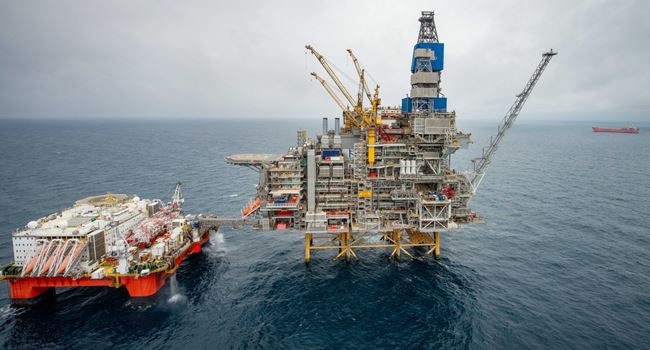Business
Oil prices approach 11% weekly rise amid U.S., Norway shutdowns; Bonny Light gains $1.34

Oil prices edged up on Friday, brightening the two benchmarks’ chances of recording their strongest weekly advancements since early June, following output shutdowns occasioned by a storm in the Gulf of Mexico and an onshore employees’ industrial action in Norway.
Brent climbed up by 16 cents at $43.50 a barrel by 08:48 West Africa Time. U.S. West Texas Intermediate (WTI) crude advanced by 14 cents to $41.33.
Bonny Light, Nigeria’s premium oil grade, added $1.34 to close at $41.58 at the previous session. But Qua Iboe, also a major national oil grade, dipped $0.04 to $40.86 that same day.
Brent and WTI are on course for gains in the neighbourhood of 11% this week, the first weekly appreciation in three weeks.
Brent’s six-month contango, a market situation where the front-month Brent futures are trading lower than later contracts suggesting current oversupply, has tightened to nearly $1.90 a barrel compared to the $3.24 of less than a month ago.
Read also: Oil prices rise over supply losses, U.S. relief package hopes; Bonny Light sheds $1.14
In an effort to call off a strike, Norwegian oil company and labour officials said they would hold talks with a mediator appointed by the state on Friday.
A worsened situation might cause the current shutdown from the industrial action to triple in case the matter is not resolved by the second week of October, taking the overall capacity reduction to 934,000 barrels of oil equivalents per day.
Producers have closed down 1.69 million barrels of crude per day in the Gulf of Mexico, 92 per cent of the region’s offshore oil as well as 1.67 billion cubic feet per day, or almost 62% of its natural gas output, poised for the impact of Hurricane Delta.
A senior market analyst at OANDA, Edward Moya, said “non-OPEC production is going to take a big hit over the next couple of weeks and this will continue to drive the rebalancing of the oil market.”
The Organisation of the Petroleum Exporting Country (OPEC) Thursday said global oil demand plateau in the late 2030s and could begin to fall thereafter.
Join the conversation
Support Ripples Nigeria, hold up solutions journalism
Balanced, fearless journalism driven by data comes at huge financial costs.
As a media platform, we hold leadership accountable and will not trade the right to press freedom and free speech for a piece of cake.
If you like what we do, and are ready to uphold solutions journalism, kindly donate to the Ripples Nigeria cause.
Your support would help to ensure that citizens and institutions continue to have free access to credible and reliable information for societal development.






















